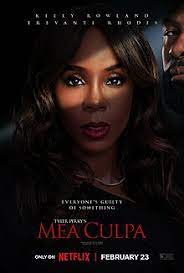
MEA CULPA
US, 2024, 120 minutes, Colour.
Kelly Rowland, Trevante Rhodes, Nick Sagar, Sean Sagar, RonReaco Lee Shannon Thornton, Kerry O'Malley, Ariana Barron, Angela Robinson, Maria Gabriela Gonzalez.
Directed by Tyler Perry.
While the title is the name of the central character, those familiar with liturgy or just the popular usage of the phrase, Mea Culpa, means through my fault and is part of the prayer of confession and the asking for forgiveness.
Tyler Perry is a significant presence in American cinema, especially African-American cinema and African-American urban life. He has studios in Atlanta Georgia, has produced many features, also written and directed many of them. And he is a well-known philanthropist.
This film needs to be appreciated for its impact On the African-American audience rather than how it might play to a white American audience.
Kelly Rowland, best known for music and music videos, plays a top lawyer, but in dispute with her drugtaking, out of job husband. His brother is DA with hopes for becoming mayor of the city. His wife is Mea’s best friend.
Complications arise when a well-known artist is accused of murdering his girlfriend, public opinion against him, paparazzi pursuit, demonstrations against the art Gallery where is paintings are displayed. He approaches Mea to represent him in court, building up a conflict of interest because the DA wants to winning the case against him. An appeal to a judge says that the trial can go ahead.
If any audience has seen and remembers Jeff Bridges and Glenn Close in the 1985 Jagged Image, they will appreciate many of the similarities, the man accused of murder, his profession of innocence, the objective lawyer, succumbing to the charms of her client, compromised – and the final solution. However, the final solution in this film is not the same despite appearances to the contrary.
The film focuses on the behaviour of Mea, her anger with her husband, his subservience to his mother with terminal cancer, her heartless domination of her children and antipathy towards Mea. The most pleasant character in the film is Mikey, RonReaco Lee Shannon, Mea’s private investigator some of his information leads to Mea’s anger, and her liaison with the artist, based on a misunderstanding.
However, there are some twists tours the end, the alleged victim been found alive, and a sudden scenario of conspiracy of the family against Mea.
Some serious themes but designed as popular entertainment.
- The title, Latin, Catholic prayer, confession of guilt – “through my fault”?
- The Chicago settings, law, business, art, affluent? Musical score?
- The work of Tyler Perry, producing, writing and directing, performing? His studios, output, for the African-American audience? Wider audiences?
- The plot and the link with the thriller, Jagged Edge? Audiences remembering the plot, the central character innocence or guilt? The lawyer, the accused seductive? Audience suspicions – and the later discovery of the victim alive, the change of plot from Jagged Edge?
- The introduction to Mea and Kal, counselling, disputes, the background of his drugs and loss of job, concealing it from his mother, the control of his mother, leaving the meeting? Mea, success is a lawyer, supporting her husband, tensions? The party for the mother, the mother’s aggressive behaviour, terminal cancer, treatment? Kal and his mother? His brother, Ray, DA and ambitions for Mayor, his wife and family, Charli the se and Mea being best friends? The tensions of the meal, the mother’s insults, dislike of Mea?
- The murder case, the artist, the scenario, the disappearance of his girlfriend, traces of skull in his painting, the protests outside the gallery, the owner and her past fostering of the artist, refusing to take down his paintings?
- The artist, Zyair, coming to see Mea, asking her to take on his case, chased by the paparazzi, his initial charm, frankness? Mea and her response, looking at the case, the damning evidence, paintings, the phone, the video accusing his claiming to speak the truth?
- The issue for Mea, conflict-of-interest with her brother-in-law, his ambitions, the decision to go before the judge, his warning, accepting their positions?
- Mea and Mickey, investigator, his following her husband, his going to rehab? Mickey and his personal style, devotion to Mea? His listening to Zaire, saying that he gave all the indications are telling the truth, but also indicating that he did not believe him? Mickey and his travels, Mexico, trying to track down the missing woman? The later information about her husband at the hotel, dire repercussions for her judgement and behaviour, and the revelation that it was a family gathering?
- Interactions between Mea and Zyair, at the office, at his loft, her businesslike approach, the paintings, his explanations, her wanting boundaries, his powerful insistence against the boundaries, his approach, blindfolding her, the painting, the blue waves? Her continued questioning? The clashes, his apology, her wanting to withdraw, his acceptance of this?
- Zyair and his seductive manner, audience reaction to him, reaction to Mea and her behaviour, the news about her husband in the hotel, the seduction, the painting, on the ceiling?
- Mea and her visit to the gallery owner, her story, her behaviour, her recounting the seduction and the parallel with the painting and the picture on the ceiling? Mea going back, the range of paintings on the ceiling, including Charlise?
- Mea and her withdrawal, going to the Dominican Republic, seeing the victim, chasing her, the police, the DA saying he would send his investigator?
- The return, with the family, the revelations of the conspiracy, the mother not sick, Charlise and her husband’s revenge, fabricating the plan? Revenge on Charlise? On her? The fight, the violence, running, her husband, allegedly dialling 911, hearing the truth, crashing the car?
- The irony that Zyair was telling the truth, his confidence in seductive manner, discussions about sexual behaviour? Mea, seduced, walking away at the end?